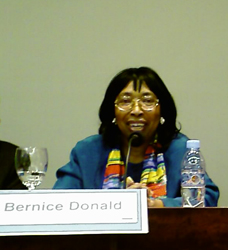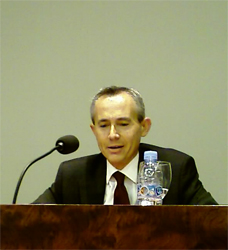Yesterday I took part in a round table — not that “round” as we were more than 50 people sitting there — about The US experience in the protection of intellectual property on the Internet, led by US Judge Bernice Donald and US Department of State (US Spain Embassy) representative Mr. Carl Schonander, and coordinated by Enric Enrich and professor Raquel Xalabarder.

The event was somehow — and as expected — very correct — that curse of our times — but, nevertheless, there were interesting statements and reflexions, specially from Mr. Schonander’s side.
All in all, the short summary of the meeting was: Yes, it looks like law is far behind reality and is not responding to today’s society demands, but it has always been this way, and, no matter, both law and society will change approaching each other: society following the law, the law accommodating the new aspects of (digital) life.
Carl Schonander spoke about the US President foreign policy, stressing that Intellectual Property (IP) really was an important part of his agenda. In this aspect, the far best Schonander’s quote is the following: IP is the currency of modern commerce
. Thus, the importance for his President — and for most developed countries’ — of this subject.
US Foreign Policy in IP issues was even more important in countries with whom the US had strategical relations: Russia and China. After stating that governments (in general) should enforce law complying, and this should be their duty just for their own benefit, he accepted this was not that easy but, nevertheless, he had hope in this vision because China and Russia will change their minds [concerning generalized piracy] when their own industries have to rely on IP to develop their own competitiveness
.

Personally, and from the point of view of a non US citizen, I think this is a more powerful argument towards following the (international) rules than many others I have heard of, mainly based in dealing with problems in the lawsuit arena. The problem is how do you tell some countries (i.e. Bangladesh, India, South Africa or Brazil) to enforce the law when this law, clearly, goes against (a) their population’s interests (b) the government itself interests (because of their unpopularity). And this raised my first question, almost in the same way as I have stated it here.
Mr. Schonander’s answer was, I must admit, witty, as he was able to turn upside down the questoin: The main incentive for poor countries to respect IP is that foreign investment won’t go to them unless it is proven that a safe environment for business exists
. So, yes, you might think that prosecuting piracy is putting barriers to your country’s progress, but not doing it is closing your doors to foreign investment and, hence, also to foreign capital boosted progress. It will be most interesting to know where the balance is in whether protecting your “right” to access knowledge and your strategy to attract investors. On the other hand, Mr. Schonander also told the audience that there already was an agreement within the international treaties framework to help developing countries access medicines for public health … but not Viagra, for instance
. I suspect that most developing countries are not really happy with this “exceptional” clauses, judging by news headlines.
My second question — and following the thread of countries considering whether following the law or not — was that it looked like intellectual property was not as widely accepted as “material” private property, and that one of the reasons might be some bad behaviors of big enterprises threatening — I actually said “blackmailing” — smaller enterprises, countries’ governments and users in general to cease and desist and pay not to be sued for astronomical amounts of money.
He admitted that this was a sincere concern of the US Government — and the international community in general —, specially after the increase of patent trolling cases all over the world that were harming both the industry(ies) and the (international) market(s). And, thus, everyone’s progress at large.
I’d really like to thank him for sharing his vast knowledge in the field. Even if we are at opposite ends of the spectrum, it was absolutely enlightening to listen to him.
If you need to cite this article in a formal way (i.e. for bibliographical purposes) I dare suggest:
Peña-López, I. (2007) “Intellectual property rights and Developing Countries” In ICTlogy,
#41, February 2007. Barcelona: ICTlogy.
Retrieved month dd, yyyy from
https://ictlogy.net/review/?p=507
Previous post: Definition of Free Cultural Works
Next post: Reminder: ICT4D Events
1 Comment to “Intellectual property rights and Developing Countries” »
 RSS feed for comments on this post.
TrackBack URI
RSS feed for comments on this post.
TrackBack URI


At QuemarLasNaves they have some commentary (in Spanish) about the meaning of being in the american blacklist becuause of copyright infringement…
Pasamos a lista negra de EEUU: ¿es para preocuparse?
http://www.quemarlasnaves.net/2007/01/11/pasamos-a-lista-negra-de-eeuu-%c2%bfes-para-preocuparse/